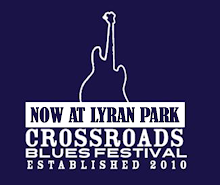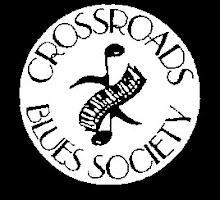Old School Rockin'
Studebaker John
Delmark Records
14 tracks
Pros...
WOW! I l have been a fan of Studebaker John's for many years. When he was signed by Delmark and released his "Maxwell Street Kings" album I was impressed by the somewhat minimalistic but totally authentic music he produced on that great CD. I reviewed it for our Blues Society and was happy to see Studebaker at the top of his game. When I got this CD and popped it in to the opening strains of "Rockin' That Boogie" and I knew I was in for something far more intense than his first Delmark release. Big, bold sounds, a driving groove, hot guitar licks, and John's always intriguing vocals sold me after a few bars, and I still had 13 tracks to go!
Perhaps one would label Studebaker John Grimaldi a throwback. He turns 60 later this year, having grown up in the tumultuous era of the 1960's in an Italian American neighborhood in Chicago. The walls between musical types were beginning to break down when he was a teenager learning to play guitar. He had already mastered the harp and drums and was cutting his teeth on the six stringed ax while listening to a mix of blues and early rock. One can see the blending of these influences in this CD, where Slim Harpo, Jimmy Reed and Hound Dog Taylor meet Peter Green and Mike Bloomfield.
I've enjoyed John's music for many years, but it seems to me he's even turned it up an additional notch with this recording. I saw him live on Saturday, April 14th in the midst of reviewing this CD and I also saw him a couple of times last year, so many of the tunes were familiar to me. His live shows are filled with the same electricity and energy as this album is. He recorded this live in the studio with minimal overdubs, so what you hear on this record is hot stuff.
"Rockin' Hot" is another of the big, driving numbers that bring the dancers out- your feet just want to move to the strains of his guitar and the back beat of Bob Halaj on bass and Albert "Joey" DiMarco on drums. It's just three guys but they produce a huge sound and make for a fiery CD. "She's rockin' hot" groans John as he sings of his woman, and the same can be said for this CD- it is rockin' hot! He stays on that theme with "Fine Little Machine", singing of being the driver for his woman's fine little machine. "Fire Down Below" features blistering harp by Grimaldi and Doug Organ appears on the B3 (the only track where the trio expands). Hot, hot stuff. The innuendos are not deep, but they don't need to be as they remind us of blues lyrics from days past. He's got some hot songs that will make believers of the those not familiar with his work and really impress those who are.
He occasionally takes the pace down a bit. The stuff in the lower gears is equally appealing. "Mesmerized" features a Latin-styled beat while "Disease Called Love" dips into the swampy side of the blues. "Dark Night' is really the only other tempo cut; but they all drip with authenticity and goodness. He handles any tempo with ease and delivers powerfully moving music to the listener at all paces.
Other songs of interest are, well ,all of the cuts. I can't single out each and every other but a few bear mention. "Deal With the Devil" is a pounding, and hauntingly cool song where John grabs you like the devil can. "She Got It Right (Dress So Tight) is another track that will get heart pumping and folks on their feet and dancing. A huge guitar solo where John takes a tour way down the neck of the guitar in a whirling and squealing 100 mph drive. And, of course, the title track is so, so true- old school rockin' done just right!
14 original tracks done by a Chicago blues original. This album is a no-brainer- buy it now. It is one of the hottest CDs I've heard in a long time and one of the best CDs I've heard in the past year! Every time I hear it I love it even more; do not pass this one up! Studebaker John has really outdone himself.
Reviewed by Steve Jones
And Cons….
First, let me say that I have been a Studebaker John fan for years. His funky and sometimes other-worldly slide guitar work has transfixed me. So it is with some sadness that I can’t seem to get “into” this CD. Much of it sounds like ZZ Top outtakes. No offense to that little ol’ band from Texas, but I’ve come to expect more originality from John.
Cut one, “Rockin’ The Boogie,”is a tell-all. The lyrics are simplistic, over a pounding rhythm that never varies. Is this the end of old school blues for John? You can almost see the on-stage choreography here. Let me add, however, that the slide work is as good as ever. Song two, sounds more like the SJ of old. Quirky chording and a varied beat take us into “A Disease Called Love.” This cut is a nice glimmer of Studebaker John’s older work. Unfortunately there isn’t enough of the John we love. Cut three, “Fire Down Below,” takes us right back to heavy arena rock with slide guitar over top. Could AC/DC cover this tune – yes. Add John Popper on harp and, well, it’s rock n roll. “Rockin’ Hot” follows. More ZZ Top meets Dave Edmunds. Sokay, a guy’s gotta make a livin’. More simple lyrics in the vein of “Sharp-Dressed Man,” or “She’s Got Legs.” What’s missing is the radio-friendly groove. Oh, what was I saying about ZZ Top? Cut five, “Fine Little Machine,” stinks of, well, you know. John – why, why, why? “Old School Rockin’” a romp-boogie that John struggles to force in some cumbersome lyrical phrases. I’ve heard this before: cantankerous lyrics that the writer refuse to a amend for some reason or another when a little whittling would smooth out the phrase. Oh well, I’m just a reviewer. Did I mention that this song sounds a lot like ZZ Top? “She Got It Right” has a subtext of “that dress so tight.” Couple the lyrics with the slide work and false harmonic fretboard play and the take-no-prisoners boogie, and the Then Play On-era Fleetwood Mac coda and, well, he sort of DOES have it right. “Deal With The Devil,” is a slower, more of the same, droning boogie. By this point in the CD, we realize that all songs employ overdrive on the guitar work. It rocks, yes, but it get wearisome as well. Cut nine, “I Stand Alone” only swims because of the alternating rhythm pattern; otherwise it has been grafted from other songs on the CD. Lyrically, no big message. There is a pleasant break of the formula with song ten, “Mesmerized,” that employs a Latin groove, a Wes Montgomery octave-over slide that becomes some of the nicest single string work I’ve ever heard John do. If I have to pick a best cut, “Mesmerized” is it. Rock n roll revisits on cut eleven with “Band New Rider,” which is no more than “Fine Little Machine” meets “”She Got It Right.” I guess if you clone yourself it’s ok. “Dark Night” is sort of a Sonny Landreth-sounding thing that I wish would have bubbled up earlier on this CD. Too late, I’m afraid to save my ZZ Top-riddled assessment. “On The Down Low,” sounds a bit like the SJ I like with it more intricate structure, better phrasing, and well-heeled lyrics. Bravo! Studebaker John’s foray into area rock ends with “Tumblin’ Down The Road,” that features more harmonica – sorely missed herein. Not many words here, a few Billy Gibbons-esque asides, but the groove here is unquestionably rockin’.
As, I said, a guy’s got make a living. It may seem as though I hate this CD. I don’t. There are handful of cuts that remind me of why I’m a Studebaker John fan. There’s a LOT that is derivative of, well, you know. Throw this on shuffle, with THAT band and maybe Savoy Brown and Johnny Winters and you have a party!





















